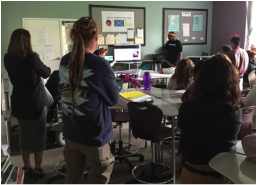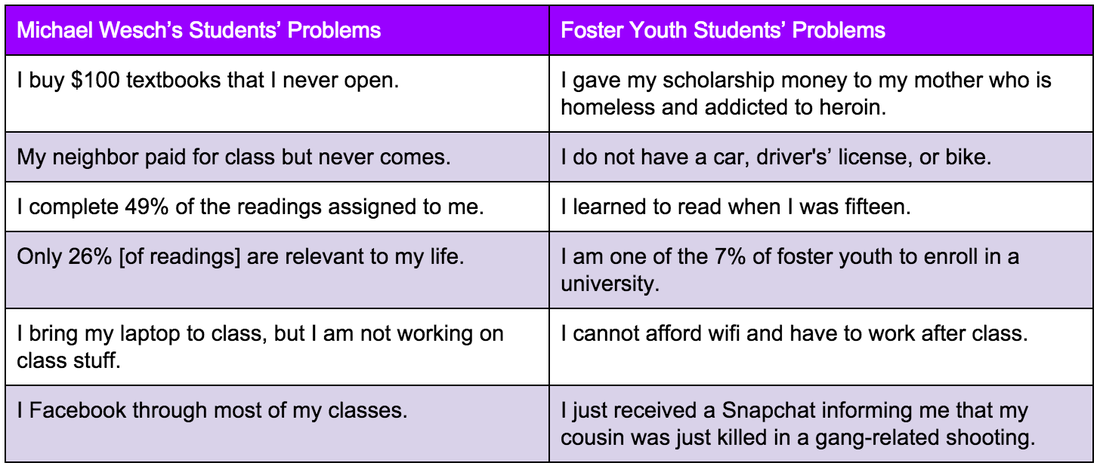 Project presentations in my classroom with "experts" and campus adults in the audience PC: Natalie Priester Project presentations in my classroom with "experts" and campus adults in the audience PC: Natalie Priester The purple and teal walls of my high school classroom look quite different from the bland ones of Michael Wesch’s university classroom. But, if they could talk, they would point out the differences in our student populations and the differences in our students’ skin color--but that is another conversation. His students’ complaints address valid concerns about our current education system and he explains how technology is changing teaching and learning. The ideas shared in Wesch’s 2010 video, “From Knowledgeable to Knowledge-able,” have been developed among the edtech community over the past five years; “embrace real problems, let students collaborate, and harness relevant tools.” Currently, I am confident in my ability to create lessons that push students to collaborate and use tools, but I am still working on figuring out the best type of “real world problems” to ask my students to explore. When developing project-based learning units or even just selecting text for my English 9 and 10 classes, I often get hung up on Welsh’s question, “What do we need to know for the rest of our lives?” I know my freshmen and sophomores should publish “something of worth” to keep up with the privileged students from our county’s High Tech High and Canyon Crest Academy who will be sitting next to them in college classes in a few years. However, I also acknowledge my students’ pasts, current challenges, and harsh realities they will face after graduation--just this morning I found out that one of our alumni just died of an overdose. Wesch’s 2010 statement that students should be taught to “embrace real problems” is a predecessor to the current trend of problem-based learning, which I am currently attempting to implement in my classroom. This past spring, I created a unit following the Buck Institute’s Project Planner. As I developed the unit, I intentionally decided to select a driving question directly relevant to my students. I want to help them learn this new learning process before pushing them into advanced unfamiliar content. My sophomores answered the question “How can we use digital media to persuade foster youth to attend San Pasqual Academy?”. While working on the project, students followed Wesch’s steps to “connect, organize, share, collect, collaborate, and publish.” I stepped back, observed, and coached as they worked. I learned that the learning which occurred throughout the entire process--from brainstorming to debriefing after the showcase--and was greater than the content of the videos they produced. In the effort of pushing myself to share, my Resident Recruitment project plan is available here. Looking ahead to the units I will plan for this summer and the upcoming school year, I want to continue to create problem-based learning units. But, I am not going to jump my freshmen right into trying to solve the world’s problems. Instead, I want them to focus on learning the process. I want the content they explore to be “of worth” to their lives, such as independent living skills, managing emotions, social skills, financial literacy, and creating and maintaining healthy relationships. These baby steps will help them to slowly build toward what Wesch terms as “knowledge-able.” Ideally, these units will better prepare them to emancipate from the foster care system while also preparing them to participate in college classes with those High Tech High students. Resource TEDxKC - Michael Wesch - From Knowledgeable to Knowledge-Able. Retrieved June 9, 2015, from https://www.youtube.com/watch?v=leaahv4uti8
1 Comment
6/9/2015 01:00:37 pm
Natalie, thank you for sharing your additional struggles working with foster youth. My students are adult EL learners and many of them in El Cajon are Iraqi refugees who have suffered trauma. I am as much of a Social Worker as I am an ESL teacher.
Reply
Leave a Reply. |
@npriesterA collection of my learning from SDSU EDL 680 Seminar in Personalized Learning Archives
August 2015
Categories |

 RSS Feed
RSS Feed